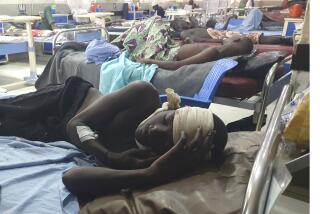Somalia suicide bombings kill 22
- Share via
NAIROBI, KENYA — A string of suicide bombings that killed 22 people in northern Somalia on Wednesday heightened fears that Islamic insurgents were becoming more sophisticated and ambitious, perhaps with help from foreign terrorists.
Five car bombings struck targets in two semiautonomous regions, officials said.
In Hargeisa, capital of Somaliland, truck bombs struck the presidential palace, the Ethiopian Consulate and a United Nations compound, killing 21 people, including a senior presidential aide. Twenty-six people were wounded, hospital officials said.
“This is the most horrific event I’ve ever seen in Somaliland,” said a spokesman for the breakaway government, Said Adani Moge, who escaped from the palace unharmed.
In the Puntland region, bombs exploded minutes apart at two local government intelligence compounds in the city of Bosasso, according to Bile Mohamoud Qabowsade, a senior government advisor.
A woman was killed and seven people were injured, he said.
The culprits were widely believed to be Islamic militants, with the attacks apparently timed to upstage a gathering of Somalia’s leaders that ended Wednesday in Nairobi, Kenya.
“It’s a clear sign that they wanted to show up the conference,” said Rashid Abdi, an analyst at the International Crisis Group, a think tank. “They wanted to show that they are still the power on the ground.”
No group claimed responsibility for the bombings, but suspicions immediately fell on an insurgent group known as Shabab, which has been fighting a guerrilla war against Somalia’s transitional government and the Ethiopian troops supporting it.
In recent months, Islamic fighters have seized several strategic areas of southern Somalia, including the port city of Kismayo. Shabab’s growing influence around the city of Baidoa, home of Somalia’s interim parliament, has led some lawmakers to urge relocating the body to Nairobi for security.
Wednesday’s bombings, apparently synchronized to occur in the morning, were unusual because of their scale and location. Northern Somalia has been relatively peaceful compared with the restive south.
“If this was Shabab, it shows that they are improving and have become a formidable force, perhaps with logistical support from outside jihadis,” Abdi said.
Shabab leaders, who have vowed to overthrow Somalia’s government and drive out the Ethiopian troops, have voiced their determination in recent months to forge closer ties with Al Qaeda.
U.S. officials, who accuse Shabab of having links to the terrorist network, launched an airstrike this year that killed one of Shabab’s top leaders.
Shabab representatives could not be reached for comment Wednesday.
Islamic hard-liners in Somalia have long criticized Somaliland for its close ties to the Ethiopian government. The northern region, which prides itself on its security and democratic progress, has been seeking Ethiopia’s help to win international support for its independence bid.
Puntland is the homeland of Somalia’s president, Abdullahi Yusuf, who has resisted efforts to incorporate the hard-line Islamists into his administration.
The conference in Kenya this week was intended to finalize a peace deal with one Islamic faction, but analysts doubt the agreement will be enough to restore peace.
--
edmund.sanders @latimes.com
Special correspondent Lutfi Sheriff Mohammed in Mogadishu, Somalia, contributed to this report.
More to Read
Sign up for Essential California
The most important California stories and recommendations in your inbox every morning.
You may occasionally receive promotional content from the Los Angeles Times.










